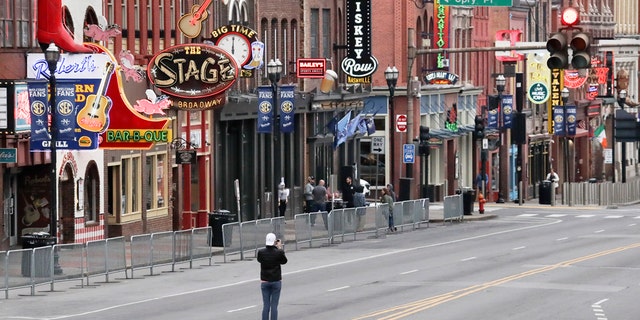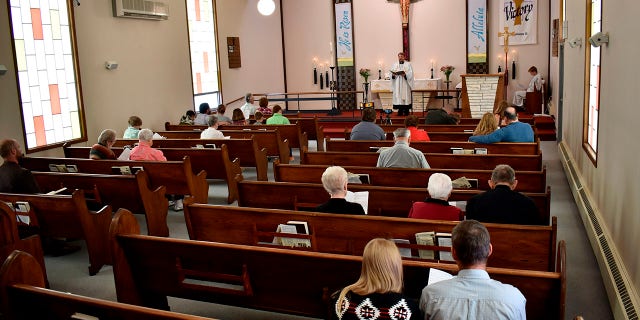By Stephen Sorace | Fox News
Tennessee, Mississippi, and Montana allowed some businesses to reopen Monday under new health guidelines as several states begin to relax coronavirus lockdown restrictions in a bid to get America’s workers safely back to work.
The moves to reopen follow in the steps of Georgia, Oklahoma, and Alaska, which on Friday began loosening lockdown restrictions on businesses despite health officials warning the gradual return to daily life might be happening too soon.
“Tennessee Pledge”
Tennessee has seen the average daily infection rate remain stable for two weeks following a ramp-up in testing, and let restaurants reopen Monday at 50 percent capacity in 89 of the state’s 95 counties, Gov. Bill Lee’s office said in a news release.
Retailers are expected to reopen Wednesday under the same rules, with workers in both industries asked to wear face coverings and follow federal guidelines regarding hygiene under the governor’s plan, dubbed the “Tennessee Pledge.”

A man stands in the middle of Broadway to take a photo where the streets and sidewalks are normally filled in Nashville, Tenn. on March 23. (AP Photo/Mark Humphrey, File)
The COVID-19 outbreak has put a burden on families and small businesses in the state, Lee said, with 15 percent of the state’s workforce – more than 400,000 people – filing unemployment claims as of last week.
“Like the rest of the country, Tennessee has taken an unprecedented economic hit with families and small businesses feeling the most pain,” the Republican governor said. “We must stay vigilant as a state, continue to practice social distancing, and engage in best practices at our businesses so that we can stay open.”
The remaining six counties – Davidson, Shelby, Knox, Madison, Hamilton, and Sullivan – operate their own health departments and decided to hold off on opening businesses until more progress is made against the spread of the virus, the Tennessean reported.
Mississippi “Safer at Home”
Mississippi Gov. Tate Reeves signed a “Safer at Home” executive order Friday that lets most retailers reopen Monday with a 50 percent reduced capacity. Businesses that cannot avoid social contact, like salons and gyms, will not be allowed to reopen, Reeves’ office said.
WHICH STATES ARE READY FOR PHASE 1 OF REOPENING AFTER CORONAVIRUS LOCKDOWN?
Movie theaters and museums will also remain closed, while restaurants will be allowed to resume take-out service.
“Wall Street and Hollywood will be fine,” the Republican governor wrote in part of a lengthy statement on Facebook. “Mississippi small businesses and workers are not. That’s who has been asked to shoulder the country’s burden. It’s not fair, and it’s not right. We have to safely, quickly re-open. That’s what we’re starting to do.”
Montana’s rollout
Montana’s Democrat Gov. Steve Bullock also gave retailers the green light to reopen Monday, with bars, restaurants, and casinos would be eligible to open May 4, as part of the state’s plan to gradually reopen.
The Treasure State took its first step Sunday, allowing churchgoers to attend services after a month-long hiatus.

Members of Christ the King Lutheran Church in Billings, Montana sing a hymn during a service Sunday following a phase-in reopening of businesses and gathering places as infection rates from the coronavirus decline in the state. (AP Photo/Matthew Brown)
Gyms, pools, movie theaters, and bowling alleys, however, will remain closed. Residents are still asked to minimize nonessential travel and to self-quarantine for 14 days after returning to the state.
“Montana was early in combating this virus,” Bullock said Friday during a news conference announcing the phased plan. “We’ve taken the right steps at the right time.”
The slow restart to normalcy in the trio of states comes just days after Republican governors in Georgia and Oklahoma allowed salons, spas, and barbershops to reopen despite the White House’s recommendations for how soon states should get back up and running.
In responding to President Trump’s criticism of his decision to reopen, Georgia Gov. Brian Kemp tweeted: “I appreciate his bold leadership and insight during these difficult times and the framework provided by the White House to safely move states forward. Our next measured step is driven by data and guided by state public health officials. We will continue with this approach to protect the lives – and livelihoods – of all Georgians.”

Gov. Kevin Stitt on balancing health and economic concerns in Oklahoma
Oklahoma Gov. Kevin Stitt joins Chris Wallace on ‘Fox News Sunday.’
Gov. Kevin Stitt of Oklahoma defended his decision to reopen his state’s economy, telling “Fox News Sunday” that it was “time for a measured reopening,” before adding that “we have to continue with the social distancing” because coronavirus does remain an issue.
“I can’t speak to what’s happening in other states, but in my state, we’re seeing the trending going down, our testing going up, our tracing, we put 80 different testing sites up, we’ve tested over 55,000 folks, our positive tests right now are 6.3 percent, and again 300 hospitalized cases across the state with a capacity for 4,600, we think it’s a reasonable time to reopen,” Stitt said.
Meanwhile, Alaska Gov. Mike Dunleavy opened the way for restaurants to resume dine-in service and retail shops and other businesses to open their doors, all with limitations. However, some Alaska municipalities chose to maintain stricter rules.
The U.S. was on the cusp of surpassing one million coronavirus cases as of Monday, with the disease killing 54,877.
Fox News’ Ronn Blitzer and The Associated Press contributed to this report.




![Trump to sign coronavirus relief executive orders Saturday to help unemployed Americans, others | USNN World News President Trump will sign executive orders Saturday aimed at delivering relief to Americans struggling with the economic fallout of the coronavirus pandemic, Fox News has learned. Trump is expected to announce the presidential action during a 3:30 p.m news conference at Trump National Golf Club Bedminster, N.J., before heading to the Hamptons for fundraising events. Trump blamed Democrats Friday for the coronavirus deal stalemate in Congress and said he'd take matters into his own hands. Earlier this week, he previewed executive orders that would extend enhanced federal unemployment benefits, suspend payroll taxes until the end of the year, extend a moratorium on evictions and help with student loan payments. TRUMP SAYS CORONAVIRUS RELIEF EXECUTIVE ORDER COULD COME BY THE END OF THE WEEK 'IF DEMOCRATS CONTINUE TO HOLD RELIEF HOSTAGE' “The president is taking action to provide relief to unemployed Americans, among other actions to provide relief," a senior administration official told Fox News Saturday. Acting unilaterally has its limits and could prompt legal challenges. Trump's orders are narrower in scope than the trillions of dollars Congress is mulling for a massive stimulus to the virus-damaged economy. Congress controls new federal spending and Trump already predicted sidestepping lawmakers will have consequences. “We’ll see, yeah, probably we’ll get sued," Trump told reporters Friday. House Democrats already passed their $3 trillion coronavirus relief bill in May. The Senate GOP last month proposed a $1 trillion plan, though didn't bring the measure to a vote as Republicans were divided on whether more aid is even needed. placeholder DESPITE POLLS AND PANDEMIC, TRUMP CAMPAIGN ARGUES CANDIDATE BETTER POSITIONED THAN IN 2016 House Speaker Nancy Pelosi and Senate Democratic Leader Chuck Schumer have been in talks all week with White House Chief of Staff Mark Meadows and Treasury Secretary Steven Mnuchin, but the two sides couldn't strike a deal. Democrats blamed the GOP for failing to understand the gravity of the crisis and for trying to "nickel and dime" struggling Americans, while the White House accused Democrats of not willing to compromise. Trump's actions aren't expected to address some of the big issues that Congressional proposals sought to tackle, including another round of $1,200 stimulus checks, aid to schools to reopen safely, an infusion of cash to revenue-strapped state and local governments, food assistance, new lawsuit protections for businesses and money for mail-in voting for the 2020 elections. Because of provisions in the Constitution that grant the legislative branch spending power, the White House can't just pull hundreds of billions out of the ether without Congressional approval. PELOSI SAYS DEMOCRATS WILLING TO COMPROMISE AT $2T FOR CORONAVIRUS BILL, REJECTED BY TRUMP ADMIN But the Trump administration believes it has access to $140 billion which it can “reprogram.” That includes $80 billion in untapped money from the big coronavirus bill signed into law in March and $40 billion from the Disaster Relief Fund. placeholder The White House believes it can divert some of this funding without congressional blessing, similar to how Trump in 2019 declared a national emergency at the border with Mexico to shift billions of dollars from the Pentagon budget to help pay for a border wall. Pelosi and Schumer earlier this week expressed skepticism about Trump's executive powers. "You can't move that much money," Pelosi said. "We're talking about a major investment." GOP OFFICIALS PREVIEW ‘EPIC’ TRUMP ADDRESS, FIRST FAMILY ROLE IN EVOLVING CONVENTION PROGRAM The Democrats want the White House to continue negotiating with Congress on a big package. "A better way to do this is [to] come to an agreement that meets the needs of the American people -- a much better way," Schumer said. The need for relief is pressing as millions of Americans lost out on the $600-per-week federal unemployment benefit that expired at the end of July. A partial moratorium on evictions on properties with government-backed mortgages also expired at the end of last month. placeholder There are some 110 million Americans living in rental households; up to 23 million renters – or 20 percent – are at risk of eviction by Sept. 30, according to an analysis by the COVID-19 Eviction Defense Project. With the supplemental $600 in unemployment benefits now officially lapsed, about 24 million Americans say they have little to no chance of being able to pay next month's rent, according to a survey by the U.S. Census Bureau. CLICK HERE TO GET THE FOX NEWS APP Rent and mortgage payments are typically the largest monthly expense for Americans: One in four tenant families pays more than half of its income for rent, a rate that’s even higher in cities like San Francisco and New York, according to Harvard’s Joint Center for Housing Studies. New jobless figures from the Labor Department, which cover the week ending August 1, show that more than 1.18 million workers sought aid last week, the lowest since March 14. The latest figures bring the total number of unemployment claims since the shutdown began to more than 55 million. The unemployment rate fell to 10.2%, down from 11.1% in June. Fox News' Mark Meredith, John Roberts, Jon Decker, Chad Pergram, Brooke Singman and Megan Henney contributed to this report.](https://www.usnn.news/wp-content/uploads/2020/08/trump-helps-unemployed-150x150.jpg)

